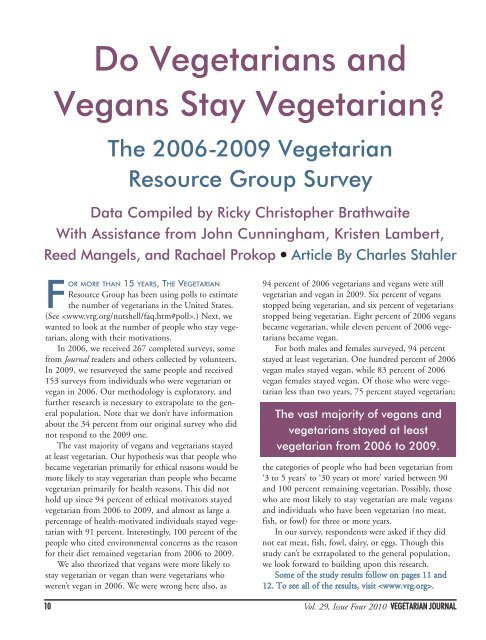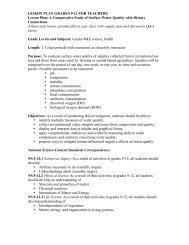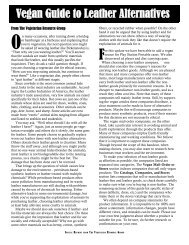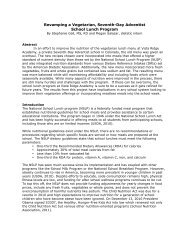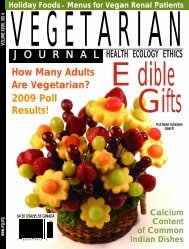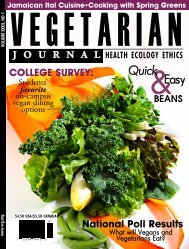Vegetarian Journal - Issue 4 2010 - The Vegetarian Resource Group
Vegetarian Journal - Issue 4 2010 - The Vegetarian Resource Group
Vegetarian Journal - Issue 4 2010 - The Vegetarian Resource Group
- No tags were found...
You also want an ePaper? Increase the reach of your titles
YUMPU automatically turns print PDFs into web optimized ePapers that Google loves.
Do <strong>Vegetarian</strong>s andVegans Stay <strong>Vegetarian</strong>?<strong>The</strong> 2006-2009 <strong>Vegetarian</strong><strong>Resource</strong> <strong>Group</strong> SurveyData Compiled by Ricky Christopher BrathwaiteWith Assistance from John Cunningham, Kristen Lambert,Reed Mangels, and Rachael Prokop Article By Charles StahlerFOR MORE THAN 15 YEARS, THE VEGETARIAN<strong>Resource</strong> <strong>Group</strong> has been using polls to estimatethe number of vegetarians in the United States.(See .) Next, wewanted to look at the number of people who stay vegetarian,along with their motivations.In 2006, we received 267 completed surveys, somefrom <strong>Journal</strong> readers and others collected by volunteers.In 2009, we resurveyed the same people and received153 surveys from individuals who were vegetarian orvegan in 2006. Our methodology is exploratory, andfurther research is necessary to extrapolate to the generalpopulation. Note that we don’t have informationabout the 34 percent from our original survey who didnot respond to the 2009 one.<strong>The</strong> vast majority of vegans and vegetarians stayedat least vegetarian. Our hypothesis was that people whobecame vegetarian primarily for ethical reasons would bemore likely to stay vegetarian than people who becamevegetarian primarily for health reasons. This did nothold up since 94 percent of ethical motivators stayedvegetarian from 2006 to 2009, and almost as large apercentage of health-motivated individuals stayed vegetarianwith 91 percent. Interestingly, 100 percent of thepeople who cited environmental concerns as the reasonfor their diet remained vegetarian from 2006 to 2009.We also theorized that vegans were more likely tostay vegetarian or vegan than were vegetarians whoweren’t vegan in 2006. We were wrong here also, as94 percent of 2006 vegetarians and vegans were stillvegetarian and vegan in 2009. Six percent of vegansstopped being vegetarian, and six percent of vegetariansstopped being vegetarian. Eight percent of 2006 vegansbecame vegetarian, while eleven percent of 2006 vegetariansbecame vegan.For both males and females surveyed, 94 percentstayed at least vegetarian. One hundred percent of 2006vegan males stayed vegan, while 83 percent of 2006vegan females stayed vegan. Of those who were vegetarianless than two years, 75 percent stayed vegetarian;<strong>The</strong> vast majority of vegans andvegetarians stayed at leastvegetarian from 2006 to 2009.the categories of people who had been vegetarian from‘3 to 5 years’ to ‘30 years or more’ varied between 90and 100 percent remaining vegetarian. Possibly, thosewho are most likely to stay vegetarian are male vegansand individuals who have been vegetarian (no meat,fish, or fowl) for three or more years.In our survey, respondents were asked if they didnot eat meat, fish, fowl, dairy, or eggs. Though thisstudy can’t be extrapolated to the general population,we look forward to building upon this research.Some of the study results follow on pages 11 and12. To see all of the results, visit .10 Vol. 29, <strong>Issue</strong> Four <strong>2010</strong> VEGETARIAN JOURNAL


